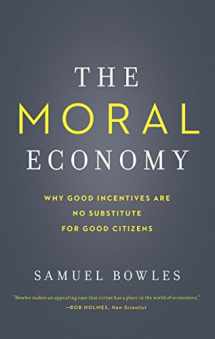
The Moral Economy: Why Good Incentives Are No Substitute for Good Citizens (Castle Lecture Series)
ISBN-13:
9780300230512
ISBN-10:
0300230516
Edition:
Reprint
Author:
Samuel Bowles
Publication date:
2017
Publisher:
Yale University Press
Format:
Paperback
288 pages
Category:
Economics
,
Consumer Behavior
,
Marketing & Sales
,
Applied Psychology
,
Psychology & Counseling
,
Applied Psychology
,
Psychology
FREE US shipping
Book details
ISBN-13:
9780300230512
ISBN-10:
0300230516
Edition:
Reprint
Author:
Samuel Bowles
Publication date:
2017
Publisher:
Yale University Press
Format:
Paperback
288 pages
Category:
Economics
,
Consumer Behavior
,
Marketing & Sales
,
Applied Psychology
,
Psychology & Counseling
,
Applied Psychology
,
Psychology
Summary
The Moral Economy: Why Good Incentives Are No Substitute for Good Citizens (Castle Lecture Series) (ISBN-13: 9780300230512 and ISBN-10: 0300230516), written by authors
Samuel Bowles, was published by Yale University Press in 2017.
With an overall rating of 4.2 stars, it's a notable title among other
Economics
(Consumer Behavior, Marketing & Sales, Applied Psychology, Psychology & Counseling, Applied Psychology, Psychology) books. You can easily purchase or rent The Moral Economy: Why Good Incentives Are No Substitute for Good Citizens (Castle Lecture Series) (Paperback) from BooksRun,
along with many other new and used
Economics
books
and textbooks.
And, if you're looking to sell your copy, our current buyback offer is $1.04.
Description
Why do policies and business practices that ignore the moral and generous side of human nature often fail?
Should the idea of economic man—the amoral and self-interested Homo economicus—determine how we expect people to respond to monetary rewards, punishments, and other incentives? Samuel Bowles answers with a resounding “no.” Policies that follow from this paradigm, he shows, may “crowd out” ethical and generous motives and thus backfire.
But incentives per se are not really the culprit. Bowles shows that crowding out occurs when the message conveyed by fines and rewards is that self-interest is expected, that the employer thinks the workforce is lazy, or that the citizen cannot otherwise be trusted to contribute to the public good. Using historical and recent case studies as well as behavioral experiments, Bowles shows how well-designed incentives can crowd in the civic motives on which good governance depends.
Should the idea of economic man—the amoral and self-interested Homo economicus—determine how we expect people to respond to monetary rewards, punishments, and other incentives? Samuel Bowles answers with a resounding “no.” Policies that follow from this paradigm, he shows, may “crowd out” ethical and generous motives and thus backfire.
But incentives per se are not really the culprit. Bowles shows that crowding out occurs when the message conveyed by fines and rewards is that self-interest is expected, that the employer thinks the workforce is lazy, or that the citizen cannot otherwise be trusted to contribute to the public good. Using historical and recent case studies as well as behavioral experiments, Bowles shows how well-designed incentives can crowd in the civic motives on which good governance depends.


We would LOVE it if you could help us and other readers by reviewing the book
Book review

Congratulations! We have received your book review.
{user}
{createdAt}
by {truncated_author}




